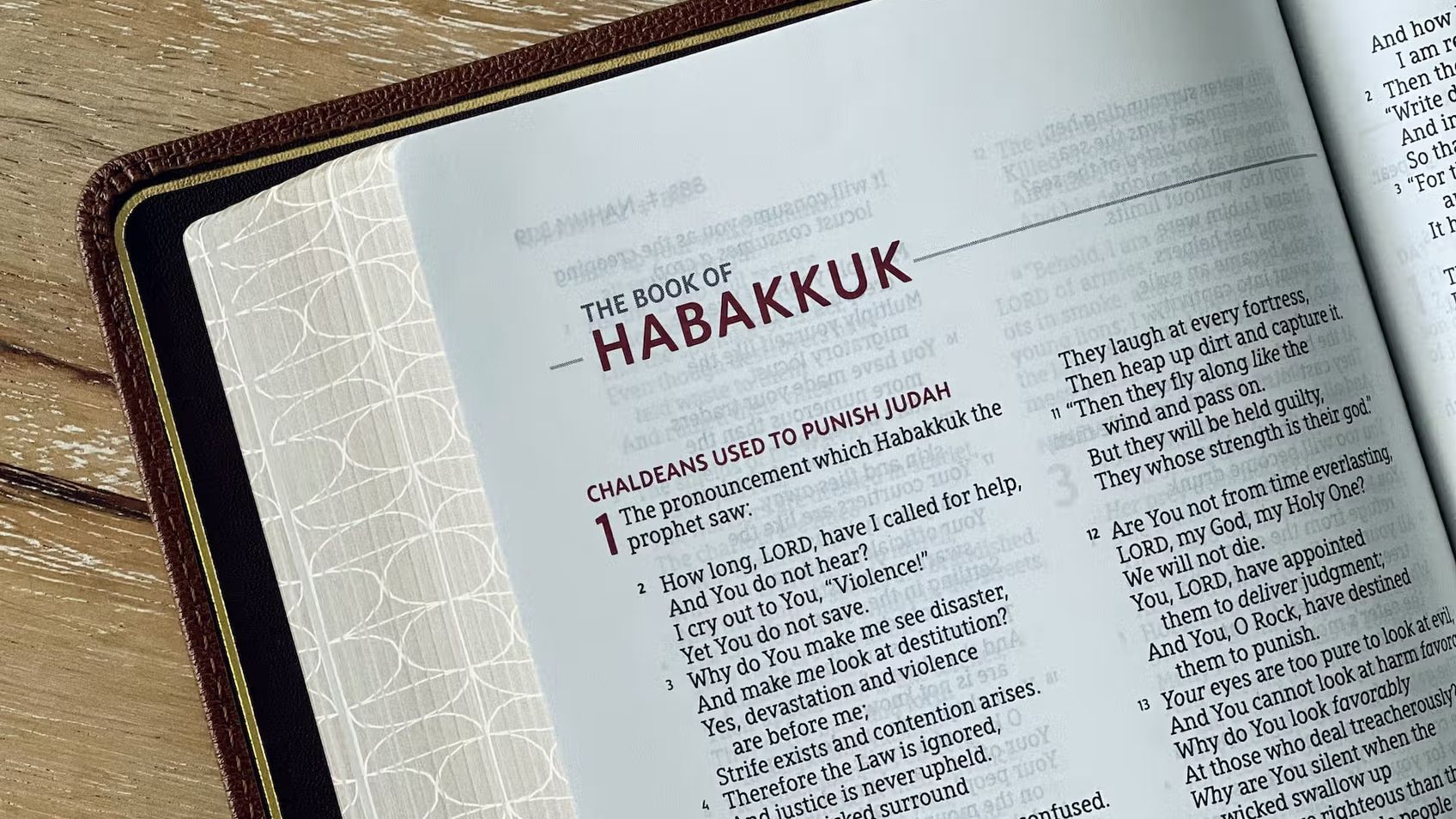Habakkuk (Full Book)

HabakkukSteve Gregg
The book of Habakkuk, attributed to the prophet Habakkuk, addresses the troubling injustice and wickedness in Judah during the late 7th century BC. Through two cycles of complaint and response, Habakkuk questions God's actions and receives divine explanations, including God's plan to use the Babylonians as an instrument of judgment. The book concludes with a powerful statement of faith and a commitment to rejoice in God's sovereignty, despite adversity. Habakkuk's significance lies in its exploration of justification by faith, as quoted by Paul in the New Testament, and its three-part structure of complaints, responses, and a concluding prayer.
Series by Steve Gregg

Daniel
Steve Gregg discusses various parts of the book of Daniel, exploring themes of prophecy, historical accuracy, and the significance of certain events.

The Holy Spirit
Steve Gregg's series "The Holy Spirit" explores the concept of the Holy Spirit and its implications for the Christian life, emphasizing genuine spirit

2 Peter
This series features Steve Gregg teaching verse by verse through the book of 2 Peter, exploring topics such as false prophets, the importance of godli

1 Samuel
In this 15-part series, Steve Gregg teaches verse by verse through the biblical book of 1 Samuel, examining the story of David's journey to becoming k

Nehemiah
A comprehensive analysis by Steve Gregg on the book of Nehemiah, exploring the story of an ordinary man's determination and resilience in rebuilding t

Hosea
In Steve Gregg's 3-part series on Hosea, he explores the prophetic messages of restored Israel and the coming Messiah, emphasizing themes of repentanc

2 Thessalonians
A thought-provoking biblical analysis by Steve Gregg on 2 Thessalonians, exploring topics such as the concept of rapture, martyrdom in church history,

Ezra
Steve Gregg teaches verse by verse through the book of Ezra, providing historical context, insights, and commentary on the challenges faced by the Jew

Gospel of Mark
Steve Gregg teaches verse by verse through the Gospel of Mark.
The Narrow Path is the radio and internet ministry of Steve Gregg, a servant Bible tea

Philippians
In this 2-part series, Steve Gregg explores the book of Philippians, encouraging listeners to find true righteousness in Christ rather than relying on
More on OpenTheo

What Is Wrong with Wokeness? With Neil Shenvi
Life and Books and Everything
January 19, 2026
In this timely interview, Kevin talks to Neil Shenvi about his new book (co-authored with Pat Sawyer), entitled “Post Woke: Asserting a Biblical Visio

How Do We Advocate for Christian Policy Without Making the Government Interfere in Every Area of Life?
#STRask
November 20, 2025
Questions about how to advocate for Christian policy without making the government interfere in every area of life, and the differences between the mo

How Can I Explain Modesty to My Daughter?
#STRask
November 27, 2025
Questions about how to explain modesty to a nine-year-old in a way that won’t cause shame about her body, and when and how to tell a child about a pre

Prove to Me That Jesus Is Not a Created Being
#STRask
January 26, 2026
Questions about why we should think Jesus is not a created being, and what it means to say God became fully human if part of being human means not bei

What Tools of Reasoning Help You Know What’s True, Right, and Good?
#STRask
December 4, 2025
Question about what tools of reasoning help us determine whether something is true or false, right or wrong, good or bad before bringing Scripture int

Did Jesus Prove He Wasn’t Sinless When He Overturned the Tables?
#STRask
December 29, 2025
Questions about whether Jesus proved he wasn’t sinless when he overturned the tables, whether Jesus’ response to the Pharisees in Mark 3:22–26 was a b

The Man on the Middle Cross with Alistair Begg
Life and Books and Everything
November 10, 2025
If you haven’t seen the viral clip, go see it right now. In this episode, Kevin talks to Alistair about the preaching clip he didn’t intend to give, h

Can You Provide Verifiable, Non-Religious Evidence That a Supernatural Jesus Existed?
#STRask
November 10, 2025
Question about providing verifiable, non-religious evidence that a supernatural Jesus existed.
* I am an atheist and militantly anti-god-belief. Ho

Could the Writers of Scripture Have Been Influenced by Their Fallen Nature?
#STRask
October 23, 2025
Questions about whether or not it’s reasonable to worry that some of our current doctrines were influenced by the fallen nature of the apostles, and h

Kingdom Priorities: Following the Teachings of Jesus
Knight & Rose Show
February 14, 2026
Wintery Knight and Desert Rose discuss Jesus' teachings from the Gospels, emphasizing truth, evidence, self-denial, and forgiveness. They explore pass

Protestants and Catholics: What’s the Difference? With Chad Van Dixhoorn, Blair Smith, and Mark McDowell
Life and Books and Everything
November 26, 2025
How should Protestants think about the Catholic Mass? About the Eucharist? About the history and development of the papacy? In this panel discussion,

Does God Hear the Prayers of Non-Believers?
#STRask
February 26, 2026
Questions about whether or not God hears and answers the prayers of non-believers, and thoughts about a church sign that reads (as if from God), “Just

Christmas Cranks and Christmas Blessings with Justin Taylor and Collin Hansen
Life and Books and Everything
December 17, 2025
If you are looking for a podcast where three friends talk about whatever they want to talk about and ramble on about sports, books, and grievances, th

Why Should We Pray If God Already Knows What’s Going to Happen?
#STRask
January 29, 2026
Questions about why we should pray if God already knows what’s going to happen, how the effectiveness of prayer is measured, and whether or not things

The Making of the American Mind with Matthew Spalding
Life and Books and Everything
February 2, 2026
The United States is unique in how much attention it pays to its founding, its founders, and its founding documents. Arguably, the most famous and mos
